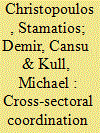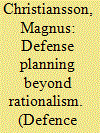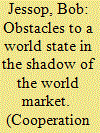| Srl | Item |
| 1 |
ID:
149939


|
|
|
|
|
| Summary/Abstract |
Increasing the energy efficiency not only requires the improvement of current technologies, but also advancement of and more coherent institutional governance. This paper captures the major structural and organisational elements of institutional governance in place for promoting energy efficiency. Looking at Croatia – one of the most successful cases of energy efficiency programming of the past decade – the paper zooms in on governance coordination (metagovernance) between actors from different sectors and operating at multiple levels. By showcasing the positive implications of the programme, the authors contribute to the debate concerned with identifying better institutional frameworks to attain sustainable development. The programme showed effective governance through vertical and horizontal coordination among institutions and stakeholders resulting in simultaneous social and economic development and improved energy efficiency in public buildings. Through the case of Croatia, this study identifies how metagovernance has supported coordination among actors aiming to create sustainable development in general and how metagovernance functions in energy efficiency related projects, in particular. The paper also sheds light on communication frameworks of governance coordination and institutional constraints lying at the heart of the vagueness of sustainable development. It also discusses private sector involvement to achieve better institutional framework to attain sustainable development.
|
|
|
|
|
|
|
|
|
|
|
|
|
|
|
|
| 2 |
ID:
160721


|
|
|
|
|
| Summary/Abstract |
This article analyzes U.S. defense planning, and more specifically the public administration of the third offset strategy. The U.S. defense bureaucracy is rooted in a tradition of rational planning, which assumes a process of consistent, value-maximizing choices within specified constrains. The cornerstone in this tradition is the program budgeting system, once created to connect plans with budgets according to preferences. The third offset strategy, aimed at dealing with the challenges of geopolitical competition and budget austerity, is influenced by a different public administration philosophy described as metagovernance. Metagovernance is a challenge to rational planning as it entails an indirect approach of organizing arenas for networks, in which start-up companies and civilian corporations get to interact with government officials in order to identify incrementally suitable acquisition projects. Furthermore, the article contextualizes this tendency in reflexive modernity, in which rationality breaks down due to the pace of societal changes and planning processes constantly become subject to feedback.
|
|
|
|
|
|
|
|
|
|
|
|
|
|
|
|
| 3 |
ID:
168175


|
|
|
|
|
| Summary/Abstract |
The Chinese government has acknowledged that in order to turn Chinese universities into world class institutions, it will have to grant them a greater degree of autonomy. However, the reforms that have been introduced to achieve this goal run counter to a long tradition of central government oversight. The question now presenting itself is how much actual control government has devolved to universities. The qualitative evidence presented in this paper, obtained through interviews with university presidents and Party secretaries, not only confirms that, as one might expect, Chinese universities continue to operate “in the shadow of hierarchy,” but also and more importantly that formal efforts to devolve authority are being rendered ineffective by informal pressures and control mechanisms. Discussion reflects on the state of play in Chinese public administration studies, and urges public policy researchers examining devolution in China to account for both formal reforms and everyday “lived experiences.”
|
|
|
|
|
|
|
|
|
|
|
|
|
|
|
|
| 4 |
ID:
113731


|
|
|
|
|
| Publication |
2012.
|
| Summary/Abstract |
This article explores the obstacles to the development and operation of a world state that are rooted in functional differentiation of modern societies, the ecological dominance of the broadly capitalist world market, and the inherent tendencies of all forms of governance to fail. It also highlights the challenges to the temporal as well as territorial sovereignty of states, whatever their scale of operation, due to the acceleration as well as globalization of social relations. Combining insights from Niklas Luhmann and Karl Marx, the article develops some novel arguments about multi-spatial metagovernance as an alternative approach to the problems posed by a world state as the guarantor of global social order.
|
|
|
|
|
|
|
|
|
|
|
|
|
|
|
|